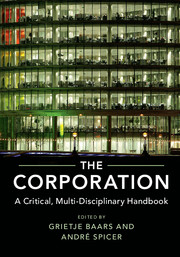Book contents
- Frontmatter
- Contents
- List of Contributors
- Acknowledgements
- Introduction: Why the Corporation?
- PART I DISCIPLINARY OVERVIEWS
- PART II INTERDISCIPLINARY THEMATIC CHAPTERS
- 1 The Evolution of the Corporate Form
- 2 The Multinational Corporate Group
- 3 The Financialization of the Corporation
- a The Financialization of the Corporation
- b Financialized Business Models and the Corporation
- c Transnational Corporations and the International Tax Haven and Offshore Finance System
- 4 Corporate Value Chains
- 5 Corporate Citizenship
- 6 The Corporation and Crime
- 7 The Corporation and Ideology
- 8 Corporation and Communities
- 9 Corporations and Resistance
- 10 Alternatives to the Corporation
- Index
- References
a - The Financialization of the Corporation
from 3 - The Financialization of the Corporation
Published online by Cambridge University Press: 31 March 2017
- Frontmatter
- Contents
- List of Contributors
- Acknowledgements
- Introduction: Why the Corporation?
- PART I DISCIPLINARY OVERVIEWS
- PART II INTERDISCIPLINARY THEMATIC CHAPTERS
- 1 The Evolution of the Corporate Form
- 2 The Multinational Corporate Group
- 3 The Financialization of the Corporation
- a The Financialization of the Corporation
- b Financialized Business Models and the Corporation
- c Transnational Corporations and the International Tax Haven and Offshore Finance System
- 4 Corporate Value Chains
- 5 Corporate Citizenship
- 6 The Corporation and Crime
- 7 The Corporation and Ideology
- 8 Corporation and Communities
- 9 Corporations and Resistance
- 10 Alternatives to the Corporation
- Index
- References
Summary
Introduction
Corporations are among the key actors in contemporary capitalism; in particular non-financial corporations have a crucial role in the productive sector. Following the OECD definition (2001), non-financial corporations are corporations whose principal activity is the production of market goods or non-financial services. In the last couple of decades, however, there has been a significant trend towards an increasingly financialized outlook and strategy of non-financial corporations – a development that has been linked to, for instance, the rise of the notion of shareholder value, increased merger and acquisition activities and redistributional consequences for workers. Non-financial corporations have increasingly turned into financial corporations with productive or service activities, with a concomitant impact on business models and significant shift of profits from productive to financial assets (e.g., Serfati, 2012).
Financialization, in Krippner's broad but accessible definition, is characterized by ‘the tendency for profit making in the economy to occur increasingly through financial channels rather than through productive activities’ (Krippner, 2011: 4). What does this process of financialization mean for non-financial corporations, which constitute the core focus of this handbook? It is quite crucial here to see financialization not only as a structural process but also as a process driven by concrete social actors and engendered by specific strategies. Financialization manifests itself in uneven ways, in different variegations of capitalism; but at the same time we can see common aspects of how it has become a pervasive feature of the modern corporation. For instance, rising debt among large firms is accompanied by a dramatic increase in repurchases of their own stock. Stock repurchases have received considerable attention in reference to the shareholder value movement (Lazonick and O'Sullivan, 2000; Lazonick, 2015) and an understanding of how they are essentially linked to broader processes of financialization can contribute to clarifying how even non-financial corporations are indeed increasingly becoming part of a rentier economy.
This chapter provides an overview of the core dimensions of the financialization of the corporation. Following a brief review of perspectives on financialization, the chapter focuses on the question of what impact financialization has on corporations and what the demands for increasing shareholder value have for corporate governance. Moreover, in order to understand these processes, the chapter emphasizes how regulatory developments in the EU and the US have facilitated and driven financialization.
- Type
- Chapter
- Information
- The CorporationA Critical, Multi-Disciplinary Handbook, pp. 281 - 290Publisher: Cambridge University PressPrint publication year: 2017
References
- 7
- Cited by



